Writing: Historical Fantasy and the Book Deal
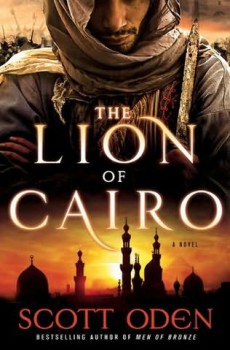
If you haven’t yet heard of Scott Oden, you’re missing a rising star in historical fiction. I learned of his work when our mutual friend, Robert E. Howard scholar Morgan Holmes, handed me a copy of Scott’s first book and urged me to read it. My “to-be-read” pile is as tottering as that of most readers, but I took Morgan at his word and was launched into an action-packed thrill ride at the side of Phoenecian mercenary leader Hasdrabal Barca in Men of Bronze. Oden’s skill with character, pacing, and description — not to mention his action chops — impressed me greatly. When I learned Scott was a fan of historical fiction writer Harold Lamb, I invited him to write an introduction for one of the Lamb historical collections I was editing.
As I’ve mentioned in previous writing posts, it was Scott who introduced me to his editor, the talented Pete Wolverton of Thomas Dunne Books, and Scott who introduced me to the agent we now share, the gifted Bob Mecoy. Scott wrote on this topic some months ago, after I took news of my own book deal public last November.
Scott’s new novel, a historical fantasy set in 11th century Cairo, hits bookstore shelves this Tuesday. I had the privilege of reading the book in manuscript, so I can tell you that it’s one of the best historical novels of the year. Its impending release seemed like a fine excuse for a discussion about historical fiction, middle-eastern protagonists, and, naturally, Harold Lamb. I lead off, then Scott follows. At the end of each exchange, we trade questions, and occasionally we interject responses.

Scott, I know that, like me, you’re a huge fan of fantasy fiction, most especially sword-and-sorcery and heroic fiction. I’m also a big fan of some science fiction (I enjoy the Miles Vorkosigan books of Lois McMaster Bujold, and grew up watching re-runs of the original Star Trek).
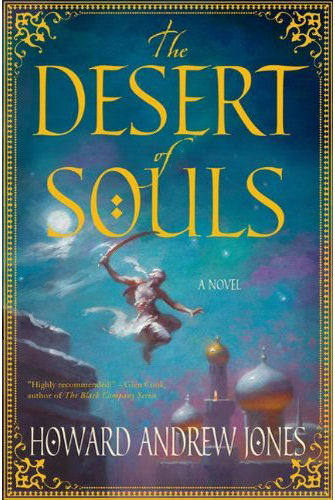
My greatest inspiration probably came from Harold Lamb and Robert E. Howard. Lamb wrote with astonishing vigor whenever he drafted historical fiction, and his ancient Muslims were brought vividly to life, be they heroes or villains. Some of Robert E. Howard’s best work are his historicals, never as popular as some of his other fiction probably because there are so few recurring characters in them. One of my favorites of his, indeed, one of my all-time favorite short stories of any kind, is “The Road of Azrael” with its witty, flawed, and dangerous narrator, Kosru Malik, a Chatagai who finds himself allied with a Frank during the Crusades. I read these stories over and over and then one day Asim stalked out of my subconsciousness and started dictating his adventures. My writing’s gotten more polished since then, and I’ve moved the location of Asim’s adventures from an imaginary quarter of the real world to real cities, but Asim’s voice is still the same.
How did you get here, and who were your influences and inspirations?

My descent into historical fiction I blame on my third grade teacher, Ms. Russell, who had us spend an entire six week period studying Ancient Egypt at the time of King Tut — including making a class project. Mine was a replica of the Boy King’s tomb.
But, I was never a voracious reader of historicals until much later. I cut my teeth on Tolkien, REH, Lovecraft, and Karl Edward Wagner.
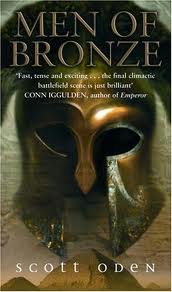 Later, my fantasy tastes expanded to include Steven Brust, Fritz Leiber, and Glen Cook. When I embarked upon the writer’s path, it was my hope and dream to write fantasy. So, how did I end up writing an historical novel? Good question . . .
Later, my fantasy tastes expanded to include Steven Brust, Fritz Leiber, and Glen Cook. When I embarked upon the writer’s path, it was my hope and dream to write fantasy. So, how did I end up writing an historical novel? Good question . . .
Men of Bronze began life as a pastiche Conan novel. And so it might have remained had a friend of mine, James Byron Huggins, not convinced me instead to write my own characters (“that way, if Tor rejects it you can always submit it elsewhere”).
I mulled it over and decided upon a historical setting after reading Geoffrey Bibby’s survey of Antiquity, “Four Thousand Years Ago.” Bibby made the ancient world seem as fantastic as any fantasy world — a rather comical “Eureka!” moment for me, as virtually every fantasy novel or story I’d read up to that point was nothing but carefully camouflaged history. I’ve always been something of a slow learner.
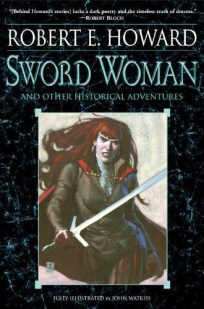
Thus, Conan of Cimmeria became the Phoenician Hasdrabal Barca, a character whose name and lineage owe their existence to Harold Lamb’s excellent bio on Hannibal. I first encountered Lamb’s work in grade school; it has had a profound effect on me, as his was the first work I’d read that made history more than the dry recitation of dates.
Something I’d always skimped on in my previous fantasy efforts was world building. I didn’t respect the process of laying the foundations of an imaginary world through real-world research until, ironically, I started looking into 26th Dynasty Egypt to flesh out a tale found in Herodotus — a tale that became the backbone of Men of Bronze. They say the Devil is in the details.
But there’s also sorcery to be found in such minutae, in the little bits and bobs of background that knit together to form the canvas of the story.
For myself, I prefer to lift color and texture from the literature of a given time period: Herodotus and the corpus of Greek literature for my Graeco-Egyptian novels, contemporary annals of the Crusades and their Muslim counterparts for The Lion of Cairo. Books on architecture, travel memoirs, documentaries, and histories fill in the remainder of the cracks.
Since I’m writing fiction, I don’t feel quite as constrained by the historian’s art — I mold the information to fit the story, though I do like staying as true to the sources as possible.
What techniques do you use, Howard, when researching your setting for the Dabir and Asim stories? What level of accuracy do you strive for? And how do you handle the inclusion of magic?

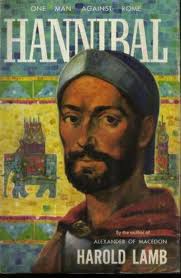 First, I have to address your mention of Harold Lamb’s biography of Hannibal. I never realized Lamb’s Hannibal was your first exposure to both Lamb and the great Carthaginian general. That was mine as well, and made me a lifelong fan of Harold Lamb and Hannibal Barca both, who was one of my boyhood heroes. I guess that’s even further proof that I was a weird kid.
First, I have to address your mention of Harold Lamb’s biography of Hannibal. I never realized Lamb’s Hannibal was your first exposure to both Lamb and the great Carthaginian general. That was mine as well, and made me a lifelong fan of Harold Lamb and Hannibal Barca both, who was one of my boyhood heroes. I guess that’s even further proof that I was a weird kid.
But as to your questions, I wish I could say that I used deliberate techniques for research. That would suggest some kind of well-considered system. What I have instead are habits. Like you, I rely a lot on the tonal qualities of period (or near period) writing, which influenced the sound of my narrator. I now know enough about the setting to “go with it” and do the research as it comes up. This means sometimes that I have to backtrack and insert important information, but this is usually more of the incidental detail, like the sort of food the characters might be eating. I remember in one early draft that characters were drinking coffee, which I realized soon after wasn’t around yet. That entailed only a cosmetic change.
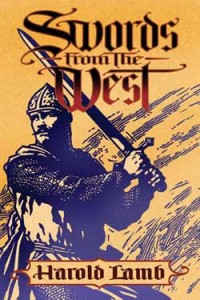
I strive to be as accurate as I can with the customs and habits of the people and the look of the cities, although there are so many blanks in the historical record that a lot of elaboration and guess work is required. For example, we don’t really know what the typical veil length was for women in the period I’m writing, nor if, indeed, they were worn much at all, or by which classes of society. Some customs have changed and disappeared and reappeared over the course of generations and centuries, and we shouldn’t assume that because such a habit is true today that it was true then. Honestly, if I allow it to do so, the absence of little pieces of cultural information drive me crazy, as it feeds into my worry that the information is out there, somewhere, and I just haven’t found it yet.
As to the incorporation of magic, I suppose I handle it a little like the old fables in that it’s there, it’s real, but it requires great study, it’s mysterious, and it’s usually practiced by wicked people for wicked purposes. And it’s quite uncommon. I’ve rarely enjoyed stories with “light” magic, where sorcery is ubiquitous and everyone uses it, much like modern technology. I prefer that it is, instead, mysterious, chaotic, and that it usually evoke a sense of ominous horror — with occasional moments of wonder. Here again I think I’ve been influenced by the pulp and sword-and-sorcery writers. Leiber’s Newhon was a world where magic worked, but it was usually pretty gruesome. The same can be said for most of the magic in most of Robert E. Howard’s varied settings.
What about your approach to magic — how do you go about it? And what about one of the more sensitive topics that you and I have to deal with in writing of the ancient Muslim world: neither of us are Muslims. Do you think that makes it more challenging to portray the culture and people accurately?

Yeah, my association with Lamb goes back quite a while, though I’m a relatively recent fan of his fiction. My school library had copies of Hannibal, Alexander of Macedon, and Genghis Khan; I wore the covers off those books. Some time later I encountered Lamb’s two volume history of the Crusades — probably the most excellent introduction to that conflict a history buff could ask for. Indeed, Lamb inadvertently inspired the arc of my second novel, Memnon. . . reading Alexander of Macedon for the umpteenth time, I was struck by his characterization of the romance between Barsine (Alexander’s first concubine) and her dead husband, the Greek general Memnon of Rhodes. It was a tragic and beautiful tale, and it informed the very heart of Memnon.
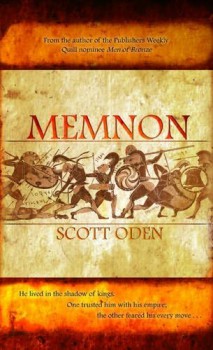 As for my approach to the use of magic, I struggled for a long time with the magical elements of The Lion of Cairo. I questioned whether or not I wanted flashy, visual sorcery or something more subtle. I looked at Ancient Egyptian magic, magic from the Bible (specifically, the episode of the Witch of Endor), Medieval alchemy, and Islamic magic. I lifted the less showy bits, paired them with that sense of doom one finds clinging to REH’s sorcerors, and prayed it would work. Interestingly, I’ve been asked on more than one occasion if Assad’s salawar was inspired by Moorcock’s Stormbringer. The answer is: kind of. The Hammer of the Infidel is part Stormbringer and part the One Ring from Tolkien — hopefully with a bloody spin. It is the subject of the next book of the trilogy, The Damascene Blade.
As for my approach to the use of magic, I struggled for a long time with the magical elements of The Lion of Cairo. I questioned whether or not I wanted flashy, visual sorcery or something more subtle. I looked at Ancient Egyptian magic, magic from the Bible (specifically, the episode of the Witch of Endor), Medieval alchemy, and Islamic magic. I lifted the less showy bits, paired them with that sense of doom one finds clinging to REH’s sorcerors, and prayed it would work. Interestingly, I’ve been asked on more than one occasion if Assad’s salawar was inspired by Moorcock’s Stormbringer. The answer is: kind of. The Hammer of the Infidel is part Stormbringer and part the One Ring from Tolkien — hopefully with a bloody spin. It is the subject of the next book of the trilogy, The Damascene Blade.
Writing about cultures not my own is inherently difficult, and writing about past cultures such as ancient and medieval Egypt or Greece comes with the added responsibility of trying to turn off my 21st century mindset in order to hear the voices of the past. I have to suppress the impulse to judge a culture over such sensitive topics as slavery, sexuality, and violence. I didn’t have many hand-wringing moments while attempting to bring to life the medieval Islamic world of The Lion of Cairo, but there was one gigantic potential landmine: I was dealing with an organization — the Assassins — that was inarguably the first true terrorist network. And I was trying to make a mass murderer from Alamut into the good guy!
Let’s face it, no Ancient Egyptians will arise and take umbrage if I choose to portray Ahmose II as a stinking drunk and a pedophile, nor will a mob of Spartans chase me through the countryside if I saddle Leonidas with crossdressing tendencies. No partisans remain to them save scholars and lovers of history. But the Muslim world is different; it is very much alive — and it has at its heart a religion with a minority of adherents who tend to react violently to slights, real or perceived. It becomes, then, a question of balancing sensitivity and respect with brutal reality. Islam, like Christianity, has its warts — from factional fighting and warring doctrines to members who preach bloody intolerance and rulers who cloak a thirst for power in the mantle of religion — but it can also be as beautiful and austere as the desert, filled with poetry and music and an impenetrable sense of mystery. A non-Muslim writer needs must focus on both peaks in order to find their path through the valley between.
What’s been your experience as a non-Muslim writer, Howard? And, as a newly-minted novelist, what advice can you give for those hoping to follow in your footsteps? What part of the process do you love most … and love the least?

I would like to think that I approach the the portrayal of a culture that is not my own with as much care and consideration as you have done, although I have to admit that I’ve never written about the process as eloquently as you just did here. I am also impressed by the great thought and care with which you approached the use of magic in your own fiction.
Scott replies: Thank you. And having read THE DESERT OF SOULS, I can say without hesitation that you’ve portrayed Dabir and Asim’s world quite expertly. One of the hardest parts, I think, is evoking with minimal verbiage the *feel* of what amounts to an alien world. Sensory detail is key: colors, textures, smells, and sounds. I’m a proponent of setting as character, and I loved the little brief asides that cemented your world in my imagination.
Well, thank you. That’s high praise coming from someone whose fine command of setting –not to mention pacing — often leaves me in awe. As to your second question, as a new novelist, I have to say that I don’t feel like enough of an expert to be offering that much advice. It does seem that if “book deal” is the mountain, that there are many ways to its height, and that mine involved a whole lot of writing and practice. Do you recall who it was who said that you needed to write about a million words of bad fiction before you wrote anything good? It’s a good analogy that gets to the heart of things, even if it’s not completely accurate (mileage varies — I probably had to write about two million words). Keep writing, keep reading. Live life. Ask questions so you can keep learning. Reach out to others. Be ready to pay it forward when someone opens the door for you.
What part do I love the most? Planning beforehand, and revision. I’m not really a big fan of the long, involved, rough draft part. I love the planning stage, and I love having a manuscript in hand with a start and finish that I can dig in and fix up. Maybe that’s because of all those years I spent as an editor; I’m used to it. The drafting part can be a real slog.
What about you? Any advice you’d like to pass on? What parts to you love the most and the least? And we’ve been speaking globally here. Let’s get really specific about your writing. How long were your central characters wandering around your head before you got them down on paper? You’re slated for three books, right? Do you think you might come back to the era afterward?

I’m like you where advice is concerned, Howard: I don’t feel I’ve reached the stage in my career where I’d dare presume to advise others on their work. Though I’ve written three novels, now, I often find myself at a loss when explaining *how* I came to write them. I just sat down, watched the scenes unfold in my head, and tried my best to keep up. Sometimes I use outlines and synopses — and sometimes I don’t. Men of Bronze was written willy-nilly, with nothing more than a couple of note cards and a well-worn edition of Herodotus’ The Histories as a guide. Conversely, Pete Wolverton at Thomas Dunne Books asked for a detailed synopsis for The Lion of Cairo; the end result ran some thirty-seven single-spaced pages and constituted a rather interesting first draft.
I am not blessed like Robert E. Howard to have a character stalk full-blown from my imagination, to sit at my shoulder and spin yarns of his life. No, the genesis for most of my characters is “what if?” . . . what if Achilles was a real flesh-and-blood man? What if Barsine, daughter of Artabazus and concubine of Alexander, survived to tell her story? What if an Assassin had to use his skills to preserve rather than destroy? Each question can take days or months to answer, but only then do I have a clear picture in my head of the protagonist. Sometimes, I base their physical appearance on an actor: Hasdrabal Barca from Men of Bronze looks much like Oded Fehr; Memnon of Rhodes reminds me of Rufus Sewell, and Assad from The Lion of Cairo resembles Mido Hamada. It’s a technique that helps me cement their manner and gestures in my mind.
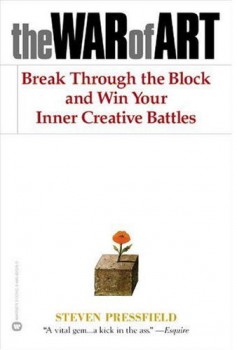 I like your analogy that a book deal is a mountain with myriad paths to its summit. The act of writing is much the same: there are as many ways to reach “the end” as their are writers; what one might find useful, another might find more of a hinderance. My best advice boils down to this: find what works for you, so long as the techniques you choose carry you to the end of your manuscript. Oh, and read. Read constantly, widely, and voraciously. Read across all genres, from bestsellers to classics. Read as much non-fiction as fiction. And in my estimation there are three “how-to” books in particular a writer needs in his or her library: Steven Pressfield’s The War of Art, Stephen King’s On Writing, and Betsy Lerner’s The Forest For the Trees. Taken together, they form for me a master-class on how to be a writer . . . not so much nuts and bolts as philosophy and attitude.
I like your analogy that a book deal is a mountain with myriad paths to its summit. The act of writing is much the same: there are as many ways to reach “the end” as their are writers; what one might find useful, another might find more of a hinderance. My best advice boils down to this: find what works for you, so long as the techniques you choose carry you to the end of your manuscript. Oh, and read. Read constantly, widely, and voraciously. Read across all genres, from bestsellers to classics. Read as much non-fiction as fiction. And in my estimation there are three “how-to” books in particular a writer needs in his or her library: Steven Pressfield’s The War of Art, Stephen King’s On Writing, and Betsy Lerner’s The Forest For the Trees. Taken together, they form for me a master-class on how to be a writer . . . not so much nuts and bolts as philosophy and attitude.
Howard interjects: I am a big fan of The War of Art, and wrote a recent post about it here at Black Gate. You’re not the first author I’ve heard recommend King’s book so highly. I know Eric Knight holds it in high regard as well, and I know I’ve seen it mentioned online before. What is it about Steven King’s book that leads so many writers to swear by it? And what’s the central thrust of Lerner’s book?
Betsey Lerner is an editor-turned-agent who brings a very unique voice to the whole culture of books and writers. It’s more of a psychological guide than a true how-to; she covers topics like jealousy, rejection, self-promo, and especially what a new writer can expect before and after the sale. She also maintains a blog that covers the same area of interest, along with forays into her own experiences as a budding screenwriter. As for King’s book . . . well, it’s Stephen King. And he’s giving advice on writing. People can say what they will about the quality or execution of his books, but the undeniable fact is this: the man knows how to sell fiction. I’d ignore his advice on how to get an agent, though. It’s woefully out of touch and really draws attention to the fact he didn’t even *have* an agent until he was successful enough that they came hunting him.
Howard interjects: Thanks for the info. Now, about those three books.
I’m actually slated for four books, Howard. The sequels to The Lion of Cairo, in what’s become the Emir of the Knife trilogy, tentatively titled The Damascene Blade and The Old Man of the Mountain. After that, I’m excited to be starting my dream project: Orc: A Tale of the Forsaken, wherein I take Orcs back to their roots. Finally, I’m working on Serpent of Hellas for Medallion Press, due out in 2012. It’s a novel about the pivotal naval battle of Artemisium, which took place across the same three days as Thermopylae, some forty miles away.
You have a couple of books slated, too, Howard, along with your work for Paizo. How many Dabir and Asim novels do you envision? And tell us about how you came to work for Paizo, publishers of the Pathfinder Roleplaying Game. What’s been your experience working with them, and how did that even happen?

The Desert of Souls hits the stores in February of 2011, the sequel, tentatively titled The Bones of the Old Ones, is slated for Feb. of 2012. I’m not currently contracted for any other novels of Dabir and Asim, but my editor and agent and I are all hoping the first two will do well enough that a series will be launched. Should I be so lucky, I plan mostly on a series of standalones, although there will be some linking elements and of course some recurring background characters. I have a number of scenarios, villains, and journeys that could keep me writing about the two for years, although I’ve long envisioned an end point adventure as well as a later “last hurrah” story when Dabir and Asim are aged.
I hope to write books about them as long as I’m having fun doing so and as long as readers are enjoying them. That said, I’ve a number of other characters and settings that are clamoring for tales to be written about them. I’d like to follow my friend E.E. Knight’s model of having two different book series running consecutively (he writes the Vampire Earth series and the Age of Fire series), but I haven’t had time to thoroughly polish my other concepts, some of which are closer to pitching than others. Like your Orc novel, most of these other ideas are fantasy rather than historical fiction, although one of the characters is heavily informed by my fascination with Hannibal Barca.
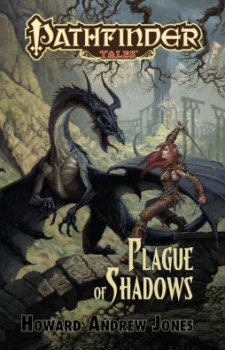
I got involved with Paizo because of my involvement with Black Gate. It’s amazing how many doors have opened because of work with Black Gate or Harold Lamb, or both. (Our meeting and resultant friendship is a perfect example.) One of my Black Gate hats is that of game review editor, and that brings me into contact with game publishers and writers. Erik Mona is Paizo’s publisher, and Paizo’s Planet Stories line is his baby, inspired by a love of many of the same pulp elements that I love myself. It was only natural that, once review copies of some of the material he’d sheparded started crossing my desk, we started exchanging occasional notes on favorite stories and writers. Erik introduced me to James Sutter, Paizo’s Fiction Editor, who shared many of our same interests. James was assembling a line-up of writers just when word broke of my sale of The Desert of Souls, so he asked to see some sample work, then offered me a chance to sign on to Paizo’s new Pathfinder Tales novel line. I did so, and I’ve had a lot of fun with the setting. James gave me leave to work with the sword-and-sorcery themes I wanted to explore, and I hope even those readers who’re unfamiliar with either Pathfinder or role-playing games will enjoy the result.
I’m going to let you have the last word, so I’ll answer my own question in the lead-in. In the next five years or so I’d like to have successfully launched two book series and see that writing for a living is not a fling, but a fact. I hope to keep working with Black Gate, and do what I can to help it reach even greater heights. In five years where do you want to be with your career, and what other stories are you wanting to tell? Do you see yourself transitioning to more fantasy stories with the launch of your Orc novel (or is it novels, plural?), or are other historical novels in your future, or both? Are what might the subjects of those novels be?

Ah, Howard . . . I want what every writer wants. In five years I want to be richer than the Queen, have millions of screaming fans, and live in a castle on the Scottish moors. A knighthood wouldn’t hurt, either. Seriously, though, I’d like to see my work extend to other media — movies, video games, that sort of thing; I’d like to keep a foot in both worlds, historical and fantasy. I’d love for the Orc book to spawn several more, but as it stands it’s meant as a singular tale, a kind of Anabasis for Orc-lovers. I’m on the fence about pursuing any kind of series beyond the Assassin trilogy. I enjoy reading them, but I’m just not certain I can enjoy writing them.
I really can see myself clinging to the gray area between history and fantasy, weaving one through the other. History itself has so many curious and little-known corners that, like REH wished for himself, I’m sure I could spend the balance of my days writing of them and barely scratch the surface. I know I’d like to write a novel about the historical d’Artagnan, perhaps one about the Vandals, and maybe a good blood-and-thunder tale exploring the character of Lucius Sergius Catalina (though I swore in jest to Steven Saylor that I wouldn’t touch the Roman era). Maybe even try my hand at narrative non-fiction, a’la Harold Lamb’s bios . . . indeed, Baybars I would make an excellent topic for a Lamb-esque biography.
But, no matter where I am in five years, I hope to remain blessed with good friends and colleagues, with a place to write and something to write about. And venues like Black Gate to serve as focal points for the mix of genres I so love. Thanks for the excellent back-and-forth, Howard!
Howard adds: Thank you, Scott. And good luck with Lion of Cairo!
These exchanges are fun reads. I hope BG does more of them.
Great exchange.
Steve’s book is wonderful, but he gets a bit theosophist here and there. I’d hate for that to put people off, because it’s such a great study of the ethics of Soldiering On.
Excellent exchange Howard and Scott, thank you much. Both of you delivered several interesting stories and points. Very cool that you’ll be sharing the before and after on that pending REH title.
And I ditto the King comments. I’ll have to check out the Pressfield book.
great books that probably will not published in Spain, can you do something about it?
[…] Neil Gaiman were the famous “Ramadan” issue of Sandman (issue #50, 1992), which helped inspire Howard Andrew Jones to create Dabir & Asim, and a story in the Sandman graphic novel Endless […]